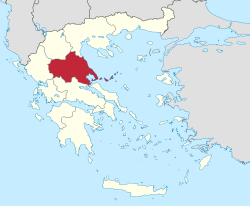Thessalia
|
Thessaly Θεσσαλία |
||
|---|---|---|
| Administrative region of Greece Traditional region of Greece |
||
|
||
 Thessaly within Greece |
||
| Coordinates: 39°36′N 22°12′E / 39.6°N 22.2°ECoordinates: 39°36′N 22°12′E / 39.6°N 22.2°E | ||
| Country |
|
|
| Decentralized Administration | Thessaly and Central Greece | |
| Capital | Larissa | |
| Regional units | ||
| Government | ||
| • Regional governor | Konstantinos Agorastos (Nea Dimokratia) | |
| Area | ||
| • Total | 14,036.64 km2 (5,419.58 sq mi) | |
| Population (2011) | ||
| • Total | 732,762 | |
| • Density | 52/km2 (140/sq mi) | |
| Time zone | EET (UTC+2) | |
| • Summer (DST) | EEST (UTC+3) | |
| ISO 3166 code | GR-E | |
| Website | www |
|
Thessaly (Greek: Θεσσαλία, Thessalía; ancient Thessalian: Πετθαλία, Petthalía) is a traditional geographic and modern administrative region of Greece, comprising most of the ancient region of the same name. Before the Greek Dark Ages, Thessaly was known as Aeolia (Greek: Αἰολία), and appears thus in Homer's Odyssey.
Thessaly became part of the modern Greek state in 1881, after four and a half centuries of Ottoman rule. Since 1987 it has formed one of the country's 13 regions and is further (since the Kallikratis reform of 2010) sub-divided into 5 regional units and 25 municipalities. The capital of the region is Larissa. Thessaly lies in central Greece and borders the regions of Macedonia on the north, Epirus on the west, Central Greece on the south and the Aegean Sea on the east. The Thessaly region also includes the Sporades islands.
In Homer's epic, the Odyssey, the hero Odysseus visited the kingdom of Aeolus, which was the old name for Thessaly.
...
Wikipedia

